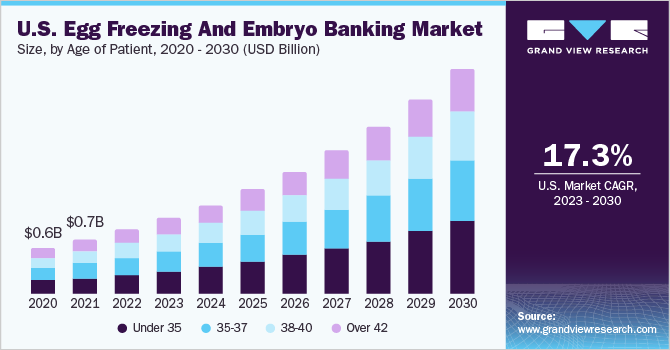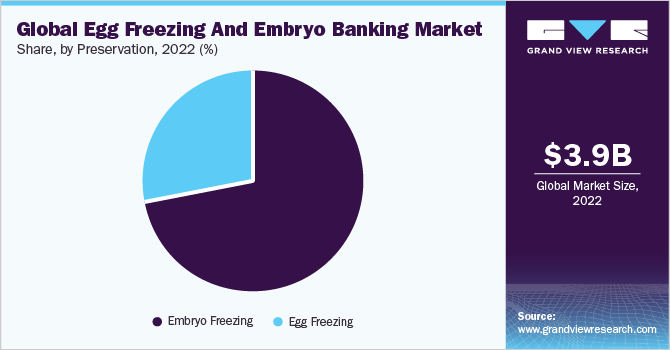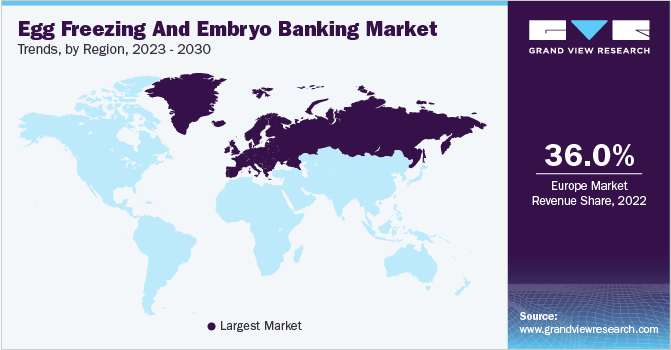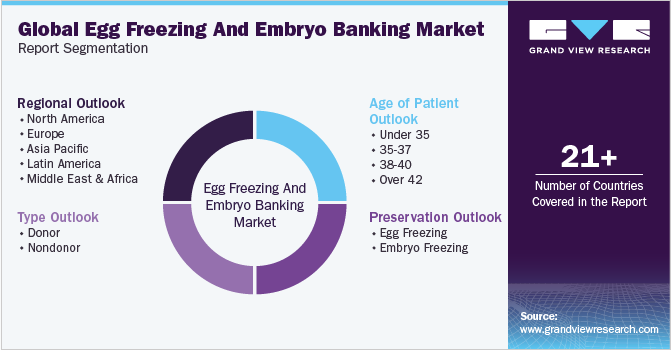
Egg Freezing And Embryo Banking Market Size, Share & Trends Analysis Report By Type (Donor, Nondonor), By Preservation (Egg Freezing, Embryo Freezing), By Age Of Patient, By Region, And Segment Forecasts, 2023 - 2030
- Report ID: GVR-4-68040-128-1
- Number of Pages: 150
- Format: Electronic (PDF)
- Historical Range: 2018 - 2021
- Industry:Healthcare
Report Overview
The globalegg freezing and embryo banking market sizewas valued atUSD 3.9 billion in 2022and is expected to grow at a compound annual growth rate (CAGR) of 16.80% from 2023 to 2030. The market for egg freezing and embryo banking is expected to expand due to societal shifts and advancements in reproductive technologies. People opt for fertility preservation throughassisted reproductive technologyfor reasons such as postponed parenting, health concerns, or career aspirations. Growing awareness and improved success rates are driving the demand for these services, ensuring market growth.

Furthermore, delayed childbearing due to sociodemographic factors is expected to contribute to market growth. For instance, according to the Centers for Disease Control and Prevention (CDC), in 2021, 167,689 of the 413,776 ART cycles were egg or embryo banking cycles, in which all the resultant eggs & embryos were stored for future use. Therefore, delayed parenthood has resulted in an inclination towards egg freezing and embryo banking, which is expected to boost market growth.
In addition, the World Health Organization's 2023 report indicates that approximately 1 in 6 adults, or around 17.5% of the global population, face issues of infertility. This statistic highlights the growing demand for accessible and affordable fertility care. To address this issue and allow for delayed parenthood, individuals are increasingly turning to the option of egg and embryo banking. This trend towards fertility preservation is expected to drive the growth of the market.
The market for egg freezing and embryo banking experienced a positive shift during the COVID-19 pandemic. As per the Human Fertilisation & Embryology Authority's report published in June 2023, the UK has witnessed significant growth in this space. In 2020, embryo storage cycles saw a 7% rise from 2019, reaching 8,878. This number further increased in 2021 with a 30% growth compared to 2019, totaling 10,719 cycles. Additionally, egg storage cycles surged by an impressive number from 2,576 in 2019 to 4,215 in 2021. The post-pandemic period has thus witnessed a spike in fertility preservation cases, fueling the expansion of the market.
The egg freezing and embryo banking industry is anticipated to witness substantial growth, propelled by government initiatives. For instance, in Australia, the re-election of the Liberal and Nationals Government has brought a broader scope of fertility treatment rebates, encompassing egg freezing procedures and increasing cycle numbers. Owing to this, an Australian woman opting for egg freezing can claim a USD 2,000 rebate, following a USD 4 million expansion within the NSW Government's USD 80 million Affordable IVF Initiative. Such proactive approaches are expected to drive market growth by enhancing the accessibility of fertility preservation.
Age of Patient Insights
The under-35-year women segment held the largest revenue share of more than 31% in 2022. This share can be attributed to the increasing prevalence of women under 35 opting for egg freezing and embryo banking procedures. The high success rate of fertilization after embryo transfer further fuels this trend. The SART Preliminary National Summary Report 2021 underscores the importance of this age group, with around 42.0% of singleton births originating from women under 35 and 87.1% being the cryopreservation rate, which is higher in comparison to other age groups.
In terms of the age of patients, the market has been categorized into under 35, 35-37, 38-40, and over 42. Women in the age group of 35-37 years contribute significantly, holding the second-largest revenue share in the market in 2022. With a singleton birth rate of approximately 30.8% and a cryopreservation rate of 81.2%, this age group contributes substantially to the market growth.
Type Insights
The nondonor segment dominated the egg freezing and embryo banking market and accounted for the largest revenue share of over 53% in 2022. According to the CDC’s preliminary National Summary 2021, the data highlights a prevailing preference for utilizing one's own eggs among women.
Women under 35 years of age comprised a substantial majority of cycles involving their own eggs/embryos, while the 35-37 age group also exhibited significant usage at a slightly lower rate. In contrast, the utilization of donor eggs/embryos was notably less, with women under 35 and those aged 35-37 years representing a relatively small portion of cycles. For women younger than 35 years old, there were a total of 45,576 embryo transfer procedures conducted.
The mean number of embryos transferred during each procedure was 1.1, and the implantation rate (percentage of transferred embryos that were successfully implanted) was 52.3% in this age group. This data shows that many women prefer using their own eggs instead of donated ones when it comes to freezing eggs and storing embryos.
Preservation Insights
The embryo banking segment dominated the market and accounted for the largest revenue share of 71.8% in 2022. This innovative concept offers individuals the opportunity to preserve their fertility potential, aligning with changing lifestyles and delayed parenthood. As awareness spreads and societal acceptance increases, the demand for these services is expected to increase. For instance, according to the Human Fertilisation & Embryology Authority's 2023 report, in the U.K., the number of embryo storage cycles increased from 2019, with a 6.87% rise in 2020 and 17.18% rise in 2021.

保护段分为egg freezing and embryo banking. According to the HFEA’s 2023 report, in the U.K., the number of egg storage cycles increased by 64% from 2019 to 2021. Modern lifestyles and delayed family planning fuel the demand for preserving fertility options. Advancements in egg storage technology have ensured a higher post-thaw viability, thus increasing confidence in future successful pregnancies. This trend empowers women to take control of their reproductive choices, propelling segment expansion.
区域的见解乐鱼APP二维码
欧洲主导the market and accounted for the maximum revenue share of over 36% in 2022. This is primarily due to the region’s well-established presence in the field of assisted reproduction technology (ART). According to a report published by the European Society of Human Reproduction and Embryology (ESHRE) in 2019, Spain emerged as the most active country in Europe in terms of assisted reproduction, conducting a total of 140,909 treatment cycles. Spain maintained its leading position over countries such as Germany (969,226 cycles), France (104,733 cycles), and Russia (121,235 cycles). Treatments encompassing IVF, ICSI, intrauterine insemination, and egg donation are all closely monitored by the ESHRE.

The Asia Pacific region is projected to experience the highest CAGR during the forecast period. Supportive regulations and Asia Pacific's emergence as a medical tourism hub, offering quality treatments at lower costs, are the primary factors driving market expansion. For instance, the Tokyo metropolitan government plans to introduce a subsidy covering the costs of egg freezing. In the fiscal 2023 budget proposal, USD 733,000 (approximately 100 million yen) has been allocated for the program's startup. This pioneering initiative aims to offer up to USD 2,199 (about 300,000 yen) per person annually to 200-300 Tokyo residents, regardless of marital status. The move addresses fertility concerns, allowing women to plan their reproductive futures amid career priorities.
Key Companies & Market Share Insights
Major players are undertaking various strategic initiatives such as collaborations, mergers & acquisitions, and geographical expansions, as well as service expansions to drive market growth. For instance, in June 2023, Pinnacle Fertility partnered with TMRW Life Sciences to adopt an automated platform for the safe storage of patients' frozen eggs and embryos. This technology-driven move would enhance the accuracy and efficiency of storage, and improve patient care. Pinnacle's commitment to innovation aligns with TMRW's novel solution, setting a new standard in fertility care through digital advancements. Some of the prominent players in the global egg freezing and embryo banking market include:
ReproTech LLC
Cryos International
CCRM Fertility
RMA Network
Carrot Fertility
WINFertility
Columbia University
Shady Grove Fertility
Kindbody
Egg Freezing And Embryo Banking MarketReport Scope
Report Attribute |
Details |
Market size value in 2023 |
USD 4.6 billion |
Revenue forecast in 2030 |
USD 13.8 billion |
Growth rate |
CAGR of 16.80% from 2023 to 2030 |
Base year for estimation |
2022 |
Historical data |
2018 - 2021 |
Forecast period |
2023 - 2030 |
Quantitative units |
Revenue in USD million and CAGR from 2023 to 2030 |
Report coverage |
Revenue forecast, company ranking, competitive landscape, growth factors, and trends |
Segments covered |
Type, preservation, age of patient, region |
Regional scope |
北美;欧洲;亚太地区;拉提n America; MEA |
Country scope |
U.S.; Canada; U.K.; Germany; France; Italy; Spain; Sweden; Norway; Denmark; Japan; China; India; Australia; South Korea; Thailand; Brazil; Mexico; Argentina; South Africa; Saudi Arabia; UAE; Kuwait |
Key companies profiled |
ReproTech LLC; Cryos International; CCRM Fertility; RMA Network; Carrot Fertility; WINFertility; Columbia University; Shady Grove Fertility; Kindbody |
Customization scope |
Free report customization (equivalent up to 8 analysts working days) with purchase. Addition or alteration to country, regional & segment scope. |
Pricing and purchase options |
Avail customized purchase options to meet your exact research needs.Explore purchase options |
Global Egg Freezing and Embryo Banking Market Report Segmentation
This report forecasts revenue growth at the global, regional, and country levels and provides an analysis of the latest industry trends and opportunities in each of the sub-segments from 2018 to 2030. For the purpose of this study, Grand View Research has segmented the global egg freezing and embryo banking market report on the basis of type, preservation, age of patient, and region:

TypeOutlook (Revenue, USD Million, 2018 - 2030)
Donor
Nondonor
PreservationOutlook (Revenue, USD Million, 2018 - 2030)
Egg Freezing
Embryo Freezing
Age of PatientOutlook (Revenue, USD Million, 2018 - 2030)
Under 35
35-37
38-40
Over 42
Regional Outlook (Revenue, USD Million, 2018 - 2030)
North America
U.S.
Canada
Europe
U.K.
Germany
France
Italy
Spain
Sweden
Norway
Denmark
Asia Pacific
China
Japan
India
South Korea
Australia
Thailand
拉提n America
巴西
Mexico
Argentina
Middle East & Africa (MEA)
South Africa
Saudi Arabia
UAE
Kuwait
Frequently Asked Questions About This Report
b.The global egg freezing and embryo banking market size was estimated at USD 3.9 billion in 2022 and is expected to reach USD 4.6 billion in 2023.
b.The global egg freezing and embryo banking market is expected to grow at a compound annual growth rate of 16.80% from 2023 to 2030 to reach USD 13.8 billion by 2030.
b.欧洲主导the egg freezing and embryo banking market with a share of over 35% in 2022. The regional growth is driven by factors such as the well-established presence in the field of assisted reproduction technology (ART).
b.Some key players operating in the egg freezing and embryo banking market include ReproTech LLC, Cryos International, CCRM Fertility, RMA Network, Carrot Fertility, WINFertility, Columbia University, Shady Grove Fertility, and KindBody.
b.Key factors that are driving the egg freezing and embryo banking market growth include delayed childbearing due to sociodemographic factors, increasing rate of infertilities and others.





